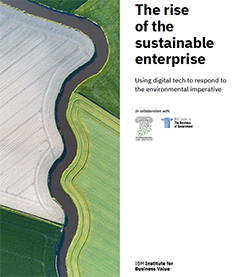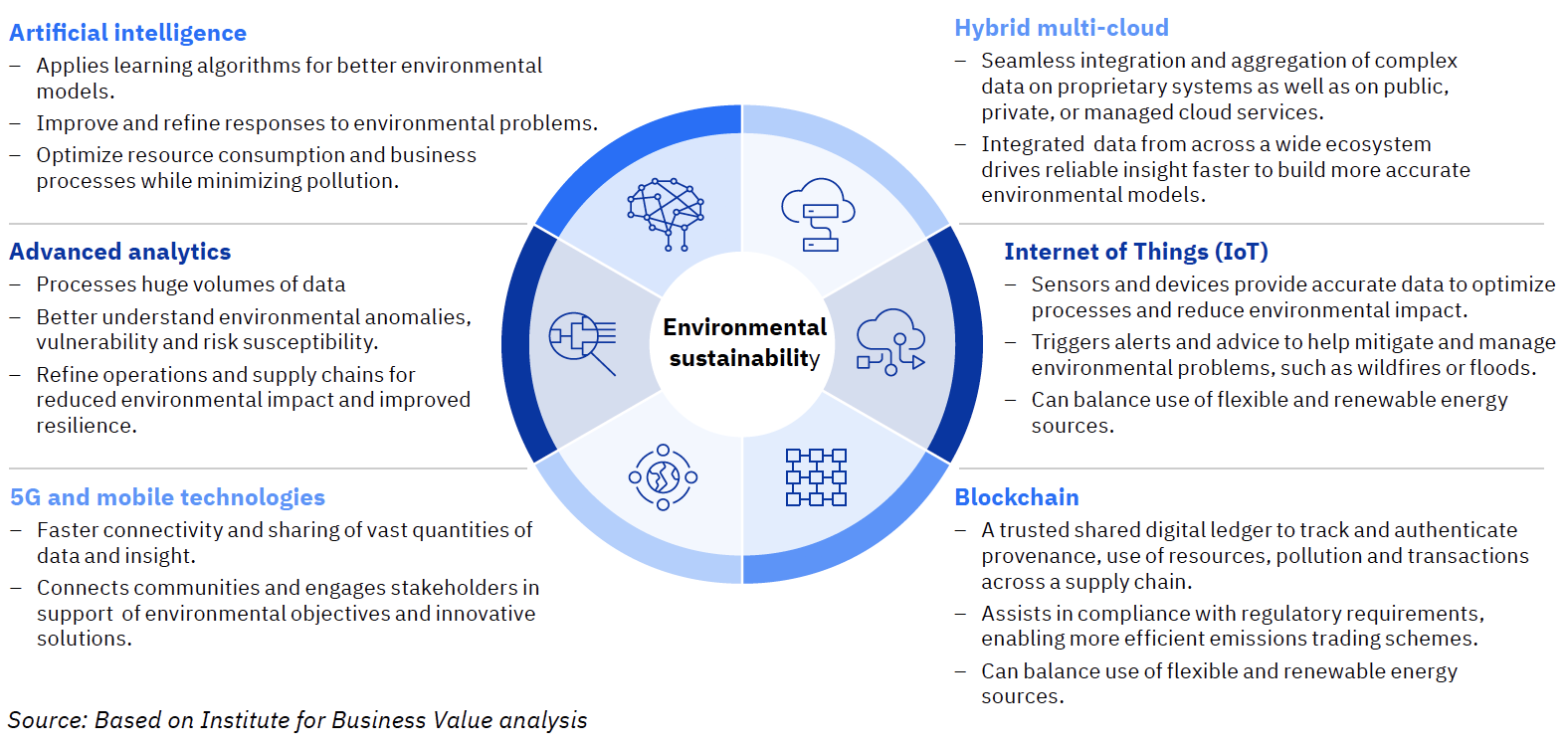
Digital Innovation Can Enable Environmental Action

Co-blogger: David Zaharchuk, Research Director, IBM Institute for Business Value
Through the IBM Institute for Business Value (IBV) and in partnership with the Environmental Law Institute (ELI), the IBM Center for the Business of Government is pleased to announce the release of a new “expert insights” report, The Rise of the Sustainable Enterprise: Using Digital Tech to Respond to the Environmental Imperative. The insights in this report come from a team with expertise bridging across environmental and technology strategies: Daniel Esty, Hillhouse Professor of Environmental Law and Policy at Yale University; Scott Fulton, President of ELI, Wayne Balta, IBM Vice President for Corporate Environmental Affairs, Product Safety, and Chief Sustainability Officer; and Jacob Dencik, Economic Research Leader with the IBV.
The report finds that sustainability is no longer just a social responsibility (CSR) issue—it’s an organizational imperative for business and government enterprises. Opportunities and risks related to the environment now challenge the strategies and operating models of organizations across all sectors and functions. In fact, environmental choices, as a subset of a broader sustainability agenda, increasingly define strategy for leading organizations.
This is becoming especially apparent from the response and recovery around COVID-19, which has made clear the speed at which developments can spread across the entire world with global economic impacts. No longer can “environmental issues” remain a discrete set of concerns – they are core to the strategic focus areas of public and private sector organizations. According to the World Economic Forum’s Global Risk Report 2020, the top five business risks were linked to environmental challenges, including extreme weather and climate action failure. The general public has also become much more environmentally conscious. A recent study by the IBV found that nearly 80 percent of consumers indicate sustainability is important to them.
As the report notes, digital transformation can help make the difference in achieving environmental objectives. Exponential technology innovations unavailable to previous generations—artificial intelligence (AI), 5G, Internet of Things (IoT), cloud, blockchain and others—will accelerate this progress in three ways. These emerging innovations can allow companies and governments to capitalize on data and gain new insights that underpin new solutions to current challenges. Applying these technologies can support greater public, private, and not-for-profit collaboration to forge a new governance model for the environmental imperative. As the authors describe, they can transform business practices and drive the emergence of the “Sustainable Enterprise.”
More data, more insight lead to more progress
Data and information underpin the ability of public and private sector organizations to drive change in business priorities and practices. Greater transparency and insight allow consumers, companies, investors, and governments to change the way they buy, produce, sell, transport, consume, and govern, which, in turn, has the potential to transform the way economies operate. Moreover, data can be infused into business processes and decision making and drive improved environmental outcomes.
The same exponential technologies that bring data and insight to bear on the environmental imperative are also reshaping operational and business models. Organizations are not just becoming “digital.” They are applying AI and other intelligent automation technology to create new platforms, and intelligent workflows to drastically improve their operations and customer experiences. They’re also using these technologies to augment the capabilities of their people and improve the employee experiences of their organizations.
Digital technologies enable many market-based mechanisms that drive change and innovation. Digital innovation support fosters action at a scale and speed that would be impossible through traditional means. Emerging technologies, such as blockchain, make it easier to share data and manage transactions that support more efficient climate markets. As noted in a recent World Bank report, “Blockchain, Big Data, the Internet of Things (IoT), smart contracts, and other disruptive technologies hold out the promise of addressing the needs of new generation climate markets post-2020.”
Emerging technologies and environmental sustainability
The combination of business model transformation and a new environmental governance structure has the potential to bring about the societal transformation needed for environmental sustainability. Digital technologies can reshape what is possible, stimulate new innovations, and enable effective ways of working together. The chart below provides more detail.
Exponential technologies and environmental sustainability
Taking these challenges and opportunities into account, the report concludes by recommending that sustainable enterprises can incorporate digital transformation into their environmental sustainability strategies and actions, and can transform business processes into “green” intelligent workflows driven by emerging technologies.
The IBV, IBM Center, and our partners in this effort will continue to engage with experts and evolve our research into this critically important intersection of digital technology and environmental sustainability, and how public and private sector organizations can collaborate to drive improved outcomes, for their customers, economies, and societies.




